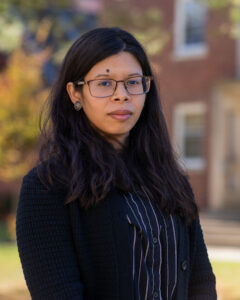By Ella Prieto, Managing Editor
Assistant professor of English Sushmita Sircar decided her future lay in the subject when she took a Shakespeare class spring semester of her first year at the State University of New York at Buffalo. Originally planning to major in economics, that class changed her mind for good.

Professor of English Sushmita Sircar (William Oehler/The Gettysburgian)
“By the time I wrote my first paper,” Sircar recalled, “it was like, yeah, I’m going to be an English major.”
Growing up in New Delhi, India, Sircar traveled to the United States to pursue her college education because she liked the idea of choosing what to study, including learning across subjects. This led to her undergraduate degree being in both English and French, allowing her to study abroad in France and even teach English in Taiwan to middle school students. The latter inspired her to teach as a profession.
However, she decided on being a professor rather than a middle or high school teacher because of her love of research, explaining “I liked the idea that someone would pay me to just read books for a while.”
After graduating from SUNY Buffalo, Sircar received her Ph.D in English from New York University before beginning her teaching career at Gettysburg College, where she has been for the last four years. Sircar commented how she has enjoyed her time at the College, especially because she can build her own classes.
“I feel like that’s maybe unusual about liberal arts colleges, that they give you a lot of freedom in choosing what to teach,” Sircar elaborated. “So being able to do that has been rewarding. It’s really exciting when you teach something you really like for the first time, and students like it too.”
Her favorite class to teach thus far is English 255, “Coming of Age: The Global Bildungsroman,” which considers how the bildungsroman, a genre that focuses on a character’s development from youth to maturity, is adapted across a range of settings.
“I’ve always been lucky with the students who have taken it…[and] I think there’s something about the young protagonists of the novels that really speaks to them, which makes the class enjoyable,” said Sircar.
For all of her classes, she brings her expertise in post-colonial works, which enables texts from around the world to be brought into conversation.
Sircar described how her introduction to post-colonial writers prompted her to teach them, commenting, “When I first read some of the anti-colonial writers that I teach, like Aimé Césaire and Frantz Fanon, I was like, oh, I totally understand what they’re saying. I can feel the rage that they’re feeling, even though they’re writing against the French in the 1960s so it’s a very different context. But it really resonated with me, and totally changed my understanding of the world in terms of histories and how the world is set up today.”
With that background in mind, works from the Caribbean, Zimbabwe, India and more share a genre that can be compared through close reading, and Sircar hopes students learn how they come together through her classes. Additionally, though, she wants students to enjoy reading.
“I always hope that they find a text or an author that they really love,” expressed Sircar. “There’s something about just falling in love with a novel that opens up how you see the world. I feel like I’ve forgotten many of the classes I took in college, but I remember so vividly reading, like, Edith Wharton for the first time. I hope the students feel similarly about something in my classes.”
This article originally appeared on page 9 of the No. 3 December 2024 edition of The Gettysburgian magazine.
